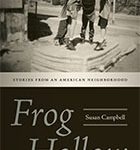
An exploration of the heart and history of Hartford’s most vibrant neighborhood
“With a journalist’s keen eye and nose for storytelling, Campbell indeed peels the layers of the ‘thick historical onion’ (her term) of one gritty New England city neighborhood to reveal the story of America.”
— Elizabeth Normen, publisher, Connecticut Explored
Frog Hollow: Stories from an American Neighborhood is a collection of colorful historical vignettes of an ethnically diverse neighborhood just west of the Connecticut State Capitol in Hartford. During the Revolutionary War, Frog Hollow was a progressive hub, and later, in the mid- to late nineteenth century, it was a hotbed of industry. Its 1870s row houses have been home to a wide variety of immigrants, and Frog Hollow was one of the first neighborhoods in the country to experiment with urban planning models, which included public parks and free education. The reporter Susan Campbell tells the true stories of Frog Hollow, with a primary focus on the nineteenth and early twentieth centuries, recounting anecdotes about the neighborhood’s inventors, entrepreneurs, and workers, as well as the impact of African American migration to Hartford, the civil rights movement, and the continuing fight for housing. From European colonists to Irish and Haitian immigrants to residents from Puerto Rico, the denizens of Frog Hollow reflect the multiple realities that make up a dynamic urban neighborhood. At the same time, their stories reveal the changing face of American cities.
Susan Campbell is the author of the memoir Dating Jesus: A Story of Fundamentalism, Feminism, and the American Girl and Tempest-Tossed: The Spirit of Isabella Beecher Hooker. Her column about the March 1998 shootings at the Connecticut State Lottery headquarters in Newington was part of the Hartford Courant’s Pulitzer Prize–winning coverage of the tragedy. She lives in Ivoryton, Connecticut.
January 3, 2019
248 pp. 40 illus., 5 1/2 x 8 1/2”
Jacketed Cloth, $24.95 978-0-8195-7620-0









